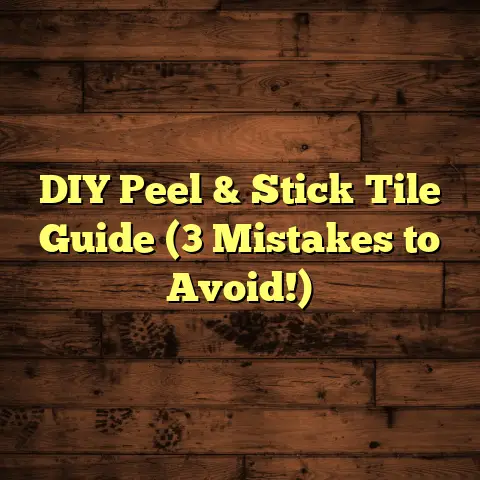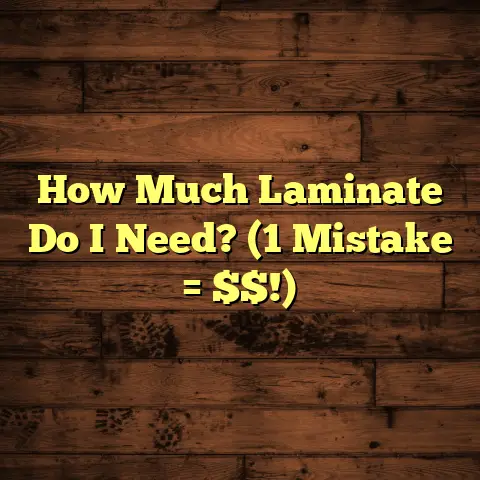Best Concrete Cleaners? (Top 5 Pros Use!)
Picture this: It’s a sunny Saturday.
Kids are playing hopscotch on a spotless
driveway.
Neighbors are grilling on a patio
that gleams.
That’s the power of clean
concrete!
I’ve seen firsthand how a sparkling driveway
or patio boosts curb appeal.
It’s not just
about looks, though.
It’s about safety,
property value, and making your outdoor
space a place you actually want to hang
out.
Choosing the right concrete cleaner? That’s where the magic happens. Let’s dive in!
Section 1: Understanding Concrete Surfaces
So, what is concrete?
It’s a mix of cement,
water, and aggregates like sand and gravel.
We use it everywhere: driveways, patios,
sidewalks, garage floors… you name it.
Think about your driveway.
It battles the
elements every day.
Sun, rain, snow, ice…
plus oil drips, tire marks, and plain old dirt.
Patios face similar foes, plus spilled drinks
and barbecue grease.
Regular cleaning?
It’s not just cosmetic.
It prevents deterioration.
It stops cracks
from spreading.
It keeps your concrete
looking good for years to come.
Trust me, a
little prevention goes a long way!
Section 2: The Science Behind
Concrete Cleaners
Concrete is porous.
Think of it like a sponge.
That’s why stains sink in so easily.
The
goal?
Find cleaners that break down those
stains at a molecular level.
Let’s talk stain types.
Oil and grease are
hydrophobic (they hate water).
Mold and
mildew thrive in damp, shady spots.
Rust?
That’s iron oxide, a whole different beast.
Each stain needs a different approach.
Most concrete cleaners rely on three main ingredients:
-
Alkaline: These are your heavy-duty degreasers. They break down oils and fats.
-
Acidic: Best for mineral stains like rust or hard water deposits. Use with caution!
Surfactants: These reduce surface tension, helping the cleaner penetrate the concrete and lift the stain.
Think of them as “wetting agents.”
Section 3: Criteria for Choosing the
Best Concrete Cleaners
Okay, time to get down to brass tacks.
What
makes a great concrete cleaner?
I look for
these five things:
Effectiveness: Does it actually remove the stain?
Seems obvious, but some cleaners are just glorified water.Safety: Is it safe for you, your pets, and your plants?
Harsh chemicals can cause serious damage.Environmental Impact: Is it biodegradable?
Does it contain harmful VOCs?
I try to choose eco-friendly options whenever possible.Ease of Use: Is it easy to apply?
Does it require special equipment?
Ain’t nobody got time for complicated cleaning routines.Cost: Is it affordable?
You don’t have to break the bank to get a good cleaner.
Remember, the type of stain matters.
An
acidic cleaner might be perfect for rust, but
it’ll do nothing for oil.
Always read the
label!
What do I look for?
I want a cleaner that’s
powerful and safe.
I want something that
gets the job done without harming the
environment.
And, of course, I want
something that’s easy to use.
Section 4: Top 5 Concrete Cleaners
Used by Pros
Alright, let’s get to the good stuff.
These
are my top 5 concrete cleaners, the ones I
reach for time and again.
(Disclaimer: Product availability and
formulations may vary.
Always check the
manufacturer’s website for the most up-to-
date information.)
1. Simple Green Concrete & Driveway Cleaner
Overview: Simple Green is a well-known brand, and their concrete cleaner is a solid all-around performer.
It’s a concentrated formula that you dilute with water.Key Features & Benefits: Non-toxic, biodegradable, and safe for use around plants and pets.
It’s also effective at removing a wide range of stains, including oil, grease, and dirt.Ideal Applications: Driveways, patios, sidewalks, and garage floors.
Works well on oil stains, grease, dirt, and grime.User Testimonials & Professional Opinions: Many users praise its effectiveness and safety.
One common complaint is that it can leave a slight residue if not rinsed thoroughly.
2. Zep Driveway and Concrete Cleaner
Overview: Zep is a professional-grade cleaner that’s available at most home improvement stores.
It’s a powerful degreaser that’s designed to tackle tough stains.Key Features & Benefits: Highly concentrated formula, removes oil, grease, and rust stains.
Can be used with a pressure washer.-
Ideal Applications: Driveways, garage floors, and other areas with heavy oil and grease stains.
User Testimonials & Professional Opinions: Pros appreciate its strength and effectiveness.
Some users find the smell to be a bit strong.
Always use in a well- ventilated area!
3. Krud Kutter Concrete & Driveway Cleaner
Overview: Krud Kutter is known for its versatility, and their concrete cleaner is no exception.
It’s a water-based formula that’s safe for use on a variety of surfaces.-
Key Features & Benefits: Removes oil, grease, mold, mildew, and algae. Biodegradable and low-VOC.
-
Ideal Applications: Patios, sidewalks, and other areas where mold and mildew are a problem.
User Testimonials & Professional Opinions: Users like that it’s effective on a wide range of stains and that it’s safe to use.
Some find that it’s not as powerful as other cleaners on heavy oil stains.
4. Oil Eater Original Cleaner Degreaser
Overview: Don’t let the name fool you; Oil Eater tackles more than just oil.
It’s a powerful, water-based degreaser that’s safe for use on concrete.Key Features & Benefits: Biodegradable, non-toxic, and non-corrosive.
Removes oil, grease, brake fluid, and other tough stains.-
Ideal Applications: Garage floors, driveways, and other areas with heavy oil and grease stains.
User Testimonials & Professional Opinions: Pros rave about its degreasing power and its safety.
Some users find that it requires a bit more scrubbing than other cleaners.
5. 30 Seconds Outdoor Cleaner
Overview: This one’s a bit different.
It’s designed to kill mold, mildew, and algae.
It’s not a degreaser, but it’s essential for keeping concrete looking fresh.Key Features & Benefits: Kills mold, mildew, and algae in 30 seconds.
No scrubbing required.-
Ideal Applications: Patios, sidewalks, and other areas where mold and mildew are a problem.
User Testimonials & Professional Opinions: Users love how easy it is to use.
Just spray it on and let it sit.
Some find that it can be a bit harsh on plants, so be careful when applying it.
Section 5: How to Use Concrete
Cleaners Effectively
Okay, you’ve got your cleaner. Now what? Here’s my step-by-step guide:
Prep the Area: Remove any loose debris, like leaves or rocks.
Sweep or blow the area clean.Mix the Cleaner: Follow the manufacturer’s instructions.
Most cleaners need to be diluted with water.-
Apply the Cleaner: Use a sprayer, brush, or mop to apply the cleaner to the concrete.
Let it Soak: Give the cleaner time to penetrate the stain.
This could be anywhere from 5 minutes to an hour, depending on the product and the severity of the stain.-
Scrub (if needed): For tough stains, use a stiff-bristled brush to scrub the area.
Rinse Thoroughly: Use a hose or pressure washer to rinse the cleaner away.
Make sure to remove all traces of the cleaner.
Safety First!
-
Wear Personal Protective Equipment (PPE): Gloves, eye protection, and a mask are essential.
-
Ensure Good Ventilation: Work in a well- ventilated area to avoid inhaling fumes.
-
Protect Your Plants: Cover any nearby plants with plastic sheeting.
Eco-Friendly Tips:
-
Choose Biodegradable Cleaners: Look for products that are labeled as biodegradable or eco-friendly.
Use a Pressure Washer Sparingly: Pressure washers can use a lot of water.
Try to use them only when necessary.
Section 6: Maintenance Tips for Long-
Lasting Concrete Surfaces
Cleaning is just the first step.
Here’s how
to keep your concrete looking its best:
Seal Your Concrete: Sealing helps to protect your concrete from stains and water damage.
Apply a sealer every 1-2 years.Clean Regularly: Sweep or blow your concrete regularly to remove dirt and debris.
Clean up spills immediately to prevent staining.Seasonal Tips:
-
Winter: Use a de-icing salt that’s safe for concrete.
Avoid using metal shovels, as they can damage the surface. -
Fall: Remove leaves promptly to prevent staining.
-
When to Call a Pro:
-
Extensive Stains: If you have large or stubborn stains, it’s best to call a professional.
-
Damaged Concrete: If your concrete is cracked or damaged, a professional can repair it.
Conclusion: The Value of Clean
Concrete
Clean concrete isn’t just about aesthetics.
It’s about creating a safe, enjoyable, and
valuable outdoor space.
Choosing the right concrete cleaner and
following a regular maintenance routine can
make all the difference.
You’ll not only
improve the look of your property, but you’ll
also extend the life of your concrete
surfaces.
So, go ahead, get out there and give your
concrete some love!
You’ll be amazed at the
difference it makes.





